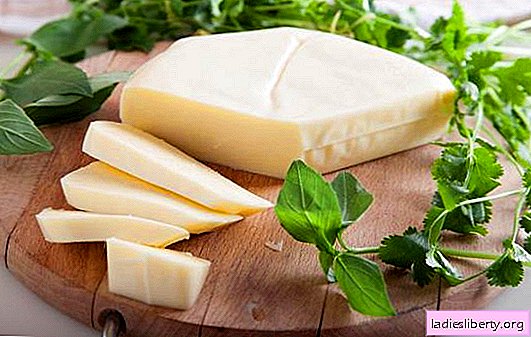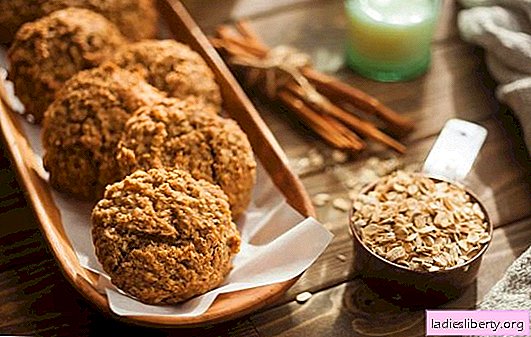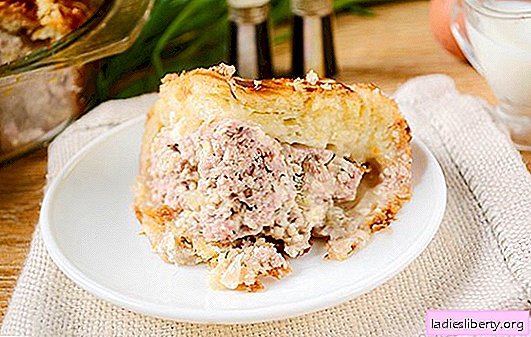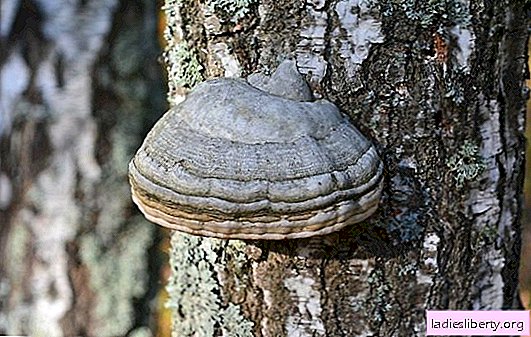
One of the most respected and delicious Georgian pickled cheeses is suluguni. The benefits of this product are enormous for those who use it, which will be discussed in the article. Also, contraindications and cases in which harm can be obtained from Suluguni will be considered.
Characteristic
Suluguni has different shades of white: snow-white, cream or yellowish. The type of milk directly affects the shade of the product. In the production of milk used these animals:
● goats;
● cows;
● sheep;
● buffalo.
Sometimes milk of different animals can be mixed. In addition to conventional production, such cheese can be smoked or made into it curd filling.
This cheese takes its roots in the Caucasus, in the town of Samegrelo.
This cheese is resistant to temperatures, tolerates them well. The structure of Suluguni is dense, so that after it has frozen, its shape holds very well. He can emphasize the taste of any dish, so he makes various salads, casseroles, soups, pies. A very tasty combination of this cheese with meat of any animal, fish, potatoes. Suluguni are often fried and added to sandwiches. Real khachapuri is made with suluguni cheese.
Composition
The usual production of suluguni cheese does not include heat treatment (unless it is a smoked version). So, in this brine cheese are all those nutrients found in ordinary raw milk. It contains in its composition:
● amino acids of organic origin;
● vitamins B, B1, B2;
● vitamins PP, C, E;
● riboflavin;
● folic acid;
● zinc;
● calcium;
● iron;
● phosphorus;
● sulfur;
● copper;
● potassium and more.
Nutritional value of suluguni per 100 g of cheese:
● 20.5 grams of protein;
● 22 grams of fat;
● 0.4 grams of carbohydrates;
● 51.9 grams of water
The calorie content of this product is 286 kilocalories per hundred grams of cheese. Because of this, such a product is high-calorie, but all the components of this cheese are easily absorbed by the human body, so eating suluguni cheese will not bring much harm to dieters. The proteins of this product are not only well absorbed, but also enrich the body with proteins that are saturated with milk. They also provide essential amino acids necessary for humans.
Cooking Suluguni
The technology for making this cheese is similar to the way some cheeses are cooked in Italy. Georgians often use mixtures of several types of milk for cheese. But the best cheese is obtained from buffalo milk and it costs an order of magnitude more expensive.
The specifics of making Suluguni largely depends on the climate of the territory, as well as the characteristics of milk. In the heat of milk, the milk turns sour very quickly and this created a lot of problems for producers, who found it difficult to maintain the high quality of suluguni under such conditions.
Therefore, cheese-makers and began to heat the raw milk, adding sour-milk bacteria that fermented milk. The result was a clot of dense structure. Then it was pressed and left in a sickle for several hours for ripening. The resulting formation is crushed and melted. The cheese mass is laid out in forms for compaction, after which it is placed in whey brine.
Suluguni at home
Despite the complexity of implementing the technology of suluguni cheese, it is still possible to make it at home, but for this you need to try a little.
In order to get 1 kg of suluguni, the following ingredients are needed:
● 8-10 liters of milk collected at home;
● 3 ml of liquid pepsin;
● Salt.
To prepare this cheese, it is necessary to pour milk into the container into which it will fit and heat to a temperature of 30-35 °. Pour pepsin into a heated mass. Put the container in a warm place for about half an hour.
We put the milk again on a small fire. Milk, which begins to curl, must be collected with your hands to the wall. As a result, lumps are formed that must be placed on a colander with gauze, where they should drain. These lumps must be put in serum for 3 hours to allow fermentation to take place.
To understand whether the fermentation process has completed, you need to place a small piece of the lump in a container of hot water. The piece should be stretched and not torn. So, the cheese mass is ready for the next cooking steps.
It is necessary to pour water into the pan and heat to a temperature of 65-70 °. At this time, the lumps formed must be cut into strips, the thickness of which should be approximately 2 cm. Then these strips must be placed in a pan, and, interfering in one direction, wait for their melting.
Cheese should be layered. It is cut still hot into parts, placed in the desired shape and allowed to cool.
Homemade suluguni is the most useful, as it does not have any other additives.
Suluguni cheese: benefits
Caucasians have good health and live long enough. And this is largely due to the use of suluguni cheese in everyday life. Its benefits lie in the following aspects:
1. Cheese has a good effect on bones and on the human musculoskeletal system. The presence of calcium and phosphorus strengthens bone tissue, thereby being a prevention against osteoporosis and rheumatism.
2. If you use Suluguni cheese regularly enough (preferably daily), then this has a positive effect on the cardiovascular system. The walls of blood vessels become strong, blood flow improves, preventing atherosclerosis and blood clots.
3. The metabolic processes in the human body, which constantly consumes suluguni, are normalized. They most often have pancreatic and thyroid secretions normal.
4. Suluguni beneficially affects the skin and tissue connections. The skin looks younger longer, smoother, has a uniform and fresh color, silky to the touch.
Thanks to its useful components, this cheese satisfies the hunger, while the body easily assimilates nutrients and does not allow fat to be deposited in the body. Suluguni prevents dysbiosis, diarrhea, constipation and other intestinal problems.
Suluguni cheese: harm
Suluguni cheese can not cause harm to the body, but this despite the fact that the production of such cheese will occur without heat treatment.
But still, you need to use it carefully for those who have diseases of the kidneys, bladder and urination system. Also cautious should be people with gastritis, stomach ulcers, duodenal ulcers and high levels of acidity of the stomach.
Smoked Suluguni cheese is more harmful than the regular version. For its manufacture using the so-called "liquid smoke", that is, it lends itself to heat treatment. This means that it loses most of its beneficial properties and minerals during this process, so the usefulness of such cheese is significantly reduced. And liquid smoke (flavoring, which includes various chemicals) can carry an additional danger for people who have any gastrointestinal diseases, liver, pancreatic secretion gland, and others. In this case, it is best to refuse the use of smoked cheese.
Suluguni cheese is contraindicated for people who are not recommended to eat salt. Also can not be used in the presence of lactose intolerance.











